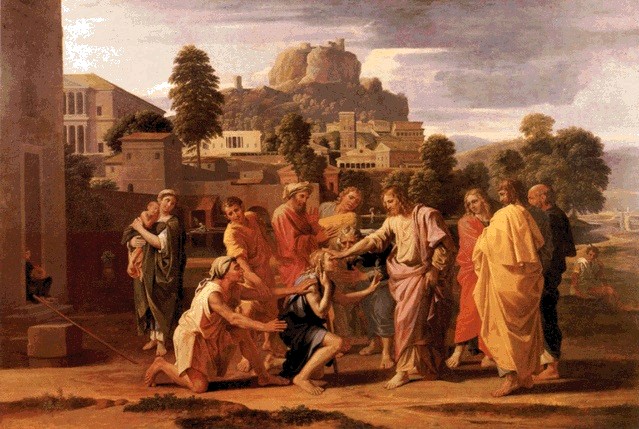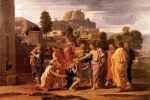
The Healing of the Blind Man of Jericho, Nicholas Poussin, 1650, oil on canvas, Musée du Louvre, Paris.
Today’s Gospel (Mark 10:46-52) is an icon of the spiritual life.
As Jesus left Jericho with his disciples and a large crowd, Bartimaeus (that is, the son of Timaeus), a blind beggar, was sitting at the side of the road. When he heard that it was Jesus of Nazareth, he began to shout and to say, ‘Son of David, Jesus, have pity on me.’ And many of them scolded him and told him to keep quiet, but he only shouted all the louder, ‘Son of David, have pity on me.’ Jesus stopped and said, ‘Call him here.’ So they called the blind man. ‘Courage,’ they said ‘get up; he is calling you.’ So throwing off his cloak, he jumped up and went to Jesus. Then Jesus spoke, ‘What do you want me to do for you?’ ‘Rabbuni,’ the blind man said to him ‘Master, let me see again.’ Jesus said to him, ‘Go; your faith has saved you.’ And immediately his sight returned and he followed him along the road.
Some highlights from Bishop Robert Barron’s homily:
- Jesus’ healings were real events in history. Bartimaeus is named and might well have been alive when the Gospels were passed along in the oral tradition and then written down. He would have been able to confirm the story.
- The story is also an icon – a symbolic itinerary – of the spiritual life.
- The setting is Jericho, a city symbolic of sin and standing athwart the purposes of God (remember Joshua). It stands for the culture that poisons the mind and the heart, the culture that produces spiritual blindness, the inability to see the deepest truth of things. In our day, secularism is a kind of blindness. Secularists do not see the transcendent dimension, the dimension of the First Cause.
- Blind Bartimaeus is a symbol of all of us, sunk in a blindness caused by the world and culture that we inhabit.
- His first great virtue is that he begs. We live in a culture of self-affirmation and self-assertion. “I’m beautiful in every way … Your words can’t get me down … I’m OK and you’re OK.” Bartimaeus knows that he’s blind and knows that there’s nothing he can do to solve his own problem. A very important moment in the spiritual life is when we realise our own helplessness in the face of our sin. The twelve step program in dealing with addictions is really useful here: when a person realises he or she has hit bottom and says, “There is nothing I can do! I can’t solve this problem. I’ve got to turn my life over to a higher power.”
- Sin is addictive. We have to turn ourselves to a higher power to solve our problem with sin. We echo Bartimaeus at the beginning of every Mass, when we say Kyrie Eleison, Lord have pity on me. We commence the Mass with a keen awareness of our blindness and our inability to save ourselves.
- We are told, “Many rebuked him, telling him to be silent.” This is, sadly, typically the case. Don’t think for a second that the majority of people will support you when you turn to Christ in our hyper-secularised time. Don’t think people will applaud you when you start begging to a higher spiritual power. That will strike a lot of people today as weird, medieval, maybe a little bit embarrassing.
- Bartimaeus kept calling out all the more. The second great virtue of Bartimaeus is persistence. How often does the Bible insist on perseverance in prayer. Augustine saw it most clearly when he said that this persistence causes the heart to expand, so that it can receive what God wants to give. If God immediately responded to all our prayers, we wouldn’t be ready to receive what he wants to give. Some of the expansion is caused by waiting.
- Jesus stopped and said, “Call him.” Many times in Mark’s Gospel, Jesus is presented as the still point in a chaotic world. “They came at him from all sides.” “He remained sleeping in the stern of the boat.” Think of that when you’re lost. Throughout the Gospel Jesus calls people. We are the sheep who are supposed to hear the call of the Good Shepherd. And of course, the church is the ekklesia, derived from the word kalein, which means to call. What is the Church but the assembly of those who have been called by Christ into intimacy with him? Bartimaeus is evocative of anybody aware of their own sin, blindness and incapacity who call out, “Help me!” and who then are hearing the summons of Jesus to come into the Church, the ekklesia. The Church is the place where your vision will be restored. The world has blinded you, the Church is the place where you will renew your vision.
- Bartimaeus throws aside his cloak, sprang up and went to Jesus. The throwing off of the cloak is a reference to baptism, for that’s precisely what someone did in the ancient Church when he approached the font for baptism. They would see his street clothes as symbolic of the old life, so he would strip off his street clothes, be plunged down into the waters of baptism and then clothed in a white garment.
- Are you burdened by your old life? Good! Throw it off. Christ is calling you to something deeper.
- Jesus asks, “What do you want me to do for you?” This is one of the handful of times when Jesus directly asks someone this question. I’ve always recommended, move into that space: you’re kneeling down before the Lord, Jesus Christ, and listen to him as he asks, “What do you want me to do for you?” That’s a really clarifying question. What would you say?
- Bartimaeus’s answer is excellent: “Master, I want to see!” Read it also on the symbolic level. He wants what we all want, namely to see things as they really are, to know the deepest truth of things, to know where he’s going. So much of life today is like drifting along without purposeful movement.
- The Lord tells him, “Your faith has saved you.” In a word, your trust and confidence in God has healed you. That’s what saved means here. What’s making us sick is our closed attitude regarding the transcendent reality of God.
- Finally, having regained his sight, he immediately follows Jesus on the way. That’s confident discipleship. He’s gone through several stages, from spiritual blindness to openness to Christ, resisting the crowd, being called and then answering the question the right way, and then recovering his sight within the life of the Church. He now knows where he’s going.
Download the readings for today:
Word format:Year B 30th Sunday 2015
Pdf format: Year B 30th Sunday 2015


August 19, 2018 at 10:31 pm
You have got terrific stuff on this website.
LikeLike